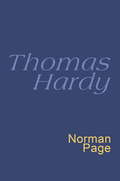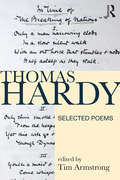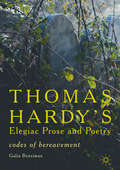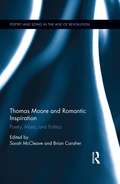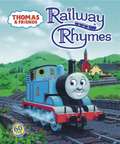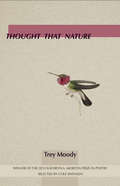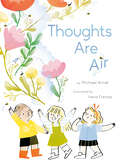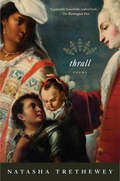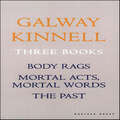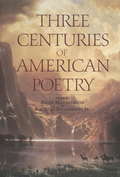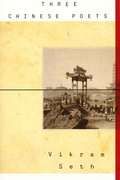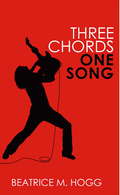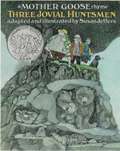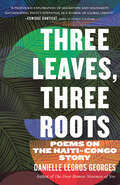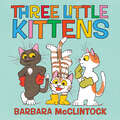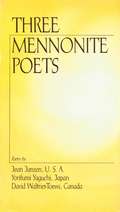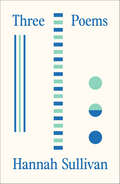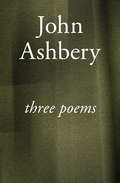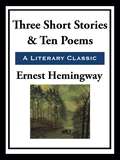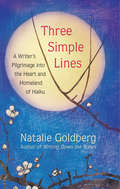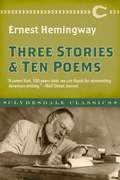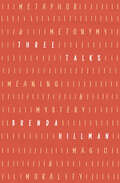- Table View
- List View
Thomas Hardy: Everyman Poetry
by Thomas HardyBoth major novelist and major poet, with a distinctive off-beat and intensely personal style, Hardy is a modern writer born out of his time.
Thomas Hardy: Selected Poems (Everyman's Poetry Ser.)
by Thomas Hardy Norman PageBoth major novelist and major poet, with a distinctive off-beat and intensely personal style, Hardy is a modern writer born out of his time.
Thomas Hardy: Selected Poems (Longman Annotated Texts)
by Tim ArmstrongIn Thomas Hardy: Selected Poems Tim Armstrong brings together over 180 poems in the first comprehensively annotated selection of Hardy's poetry. Unlike most previous selections, this edition preserves the shape of the poet's career by presenting the poems in the order in which they appeared in the Collected Poems of 1930, rather than re-ordering them thematically. Head notes to each poem give the reader information about its composition, publication, sources and metrical scheme; on-the-page notes list significant variants in Hardy's manuscripts, point out literary and other allusions, and give explanatory glosses. An appendix contains a selection of relevant passages from Hardy's notebooks, letters, and autobiography; and a bibliography suggests further reading.Tim Armstrong's critical Introduction discusses Hardy's career, his poetics, his use of memory and allusion and examines his position in the context of Victorian debates on aesthetics and belief. The generous selection of poems includes many lesser-known poems as well as those which have received most critical commentary, and the important elegiac sequence 'Poems of 1912-13' is included in its entirety.
Thomas Hardy’s Elegiac Prose and Poetry
by Galia BenzimanThis book examines the transition from traditional to modern elegy through a close study of Thomas Hardy’s oeuvre and its commitment to mourning and remembrance. Hardy is usually read as an avowed elegist who writes against the collective forgetfulness typical of the late-Victorian era. But Hardy, as argued here, is dialectically implicated in the very cultural and psychological amnesia that he resists, as her book demonstrates by expanding the corpus of study beyond the spousal elegies (the “Poems of 1912-1913”) to include a wide variety of poems, novels and short stories that deal with bereavement and mourning. Locating the modern aspect of Hardy’s elegiac writing in this ambivalence and in the subversion of memory as unreliable, the book explores the textual moments at which Hardy challenges binary dichotomies such as forgetting vs. remembering, narcissism vs. unselfish commitment, grief vs. betrayal, the work of mourning vs. melancholia, presence vs. absence. The book's analysis allows us to relate Hardy’s elegiac poetics, and particularly his description of the mourner as a writer, to shifting late-Victorian conceptualizations of death, memory, art, science and gender relations.
Thomas Moore and Romantic Inspiration: Poetry, Music, and Politics (Poetry and Song in the Age of Revolution)
by Sarah McCleave Brian G. CaraherWritten by internationally established scholars of Thomas Moore’s music, poetry, and prose writing, Thomas Moore and Romantic Inspiration is a collection of twelve essays and a timely response to significant new biographical, historiographical and editorial work on Moore. This collection reflects the rich variety of cutting-edge work being done on this significant and prolific figure. Sarah McCleave and Brian Caraher have contributed an introduction that positions Moore in his own time (1800-1850), addresses subsequent neglect in the twentieth century, and contextualises the contemporary re-evaluation of Thomas Moore as a figure of considerable interdisciplinary artistic and cultural significance. The contributions to this collection establish Moore’s importance in the fields of Neoclassical and Romantic lyricism, musical performance, song-writing, postcolonial criticism, Orientalism and biographical writing— as well as defining the significance of his voice as an engaged social and political commentator of a strongly cosmopolitan and pluralistic inclination.
Thomas and Friends: Railway Rhymes
by R. Schuyler HookeA fun collection of more than 30 original poems featuring 35 different friends from the Island of Sodor. Travel all over the island, at all times of year in this wonderful first book of poems with the Thomas touch.
Thought That Nature
by Cole Swensen Trey MoodyThought That Nature identifies and captures moments when the border between personal consciousness and the otherness of the physical become porous. Ironically, it also allows Moody to measure the distance between consciousness and direct experience, even as he casts this gap in memorable speech. This debut collection offers the reader sensual delight and intellectual pursuit-a rare and bracing combination.
Thoughts Are Air
by Michael ArndtA beautiful and timely book for anyone who needs a little inspiration to turn their dreams into reality.When a trio of friends happen upon a neighborhood tree falling into decay, an idea catches hold. But what makes a dream become a plan, and how does a plan lead to a brighter tomorrow? With deceptively simple verse, Thoughts Are Air brilliantly links thoughts, words, and actions to the water cycle. Just as air becomes water becomes solid matter, thoughts become words become actions. The comparison is subtle yet powerful--air condensing into matter; ideas condensing into doing something that matters. Completely unique and utterly accessible, this is a book to inspire curiosity and spark change-making ideas in readers young and old.
Thrall: Poems
by Natasha TretheweyThe stunning follow-up volume to her 2007 Pulitzer Prize-winning Native Guard, by America's new Poet Laureate Natasha Trethewey's poems are at once deeply personal and historical--exploring her own interracial and complicated roots--and utterly American, connecting them to ours. The daughter of a black mother and white father, a student of history and of the Deep South, she is inspired by everything from colonial paintings of mulattos and mestizos to the stories of people forgotten by history. Meditations on captivity, knowledge, and inheritance permeate Thrall, as she reflects on a series of small estrangements from her poet father and comes to an understanding of how, as father and daughter, they are part of the ongoing history of race in America.Thrall confirms not only that Natasha Trethewey is one of our most gifted and necessary poets but that she is also one of our most brilliant and fearless.
Three Books: Body Rags; Mortal Acts, Mortal Words; The Past
by Galway KinnellThese three books--Body Rags, Mortal Acts, Mortal Words, and The Past--are central to the life's work of one of the masters of contemporary poetry. Published here in one volume, they include many of Galway Kinnell's best loved and most anthologized poems. In a note, Galway Kinnell comments on the numerous revisions he has made to many of the poems for this edition.
Three Centuries of American Poetry: 1620-1923
by Allen Mandelbaum Robert D. Richardson Jr.Anthology that offers a balanced overview of American poetry from Colonial times to the Jazz Age, with the works of more than 250 poets.
Three Chinese Poets
by Vikram SethThe three T'ang dynasty poets translated here are among the greatest literary figures of China, or indeed the world. Responding differently to their common times, Wang Wei, Li Bai, and Du Fu crystallize the immense variety of China and the Chinese poetic tradition and, across a distance of twelve hundred years, move the reader as it is rare for even poetry to do.
Three Homeric Hymns
by Nicholas RichardsonThese lively narrative poems, attributed in antiquity to Homer, are works of great charm. Composed for recitation at festivals in honour of the gods, they tell of Apollo's birth on the island of Delos and his foundation of the Delphic oracle; Hermes' invention of the lyre and theft of his brother Apollo's cattle; and Aphrodite's love affair with the mortal Anchises. This edition offers a new text of these poems. The Introduction discusses among other things the nature and purpose of the poems in general, their origins, their structure and themes. The Commentary brings out the individual character of each Hymn, by analyzing in depth its language and literary qualities, and also its religious and historical aspects. The aim is to make these Hymns more accessible to students of Greek literature, and help them to appreciate the poems more fully as major works of early Greek poetry.
Three Jovial Huntsmen
by Susan JeffersDespite the many animals in the forest, three hunters see only a ship, a house, and a pincushion and find nothing to shoot.
Three Leaves, Three Roots: Poems on the Haiti-Congo Story
by Danielle Legros GeorgesA Haitian-born, Boston-based poet explores the personal and political stories of the Haitians who were part of Congo&’s 1960s decolonization movementBetween 1960 and 1975, thousands of Haitian professionals emigrated to Congo, a fellow Black francophone nation that emerged under the revolutionary new leadership of Patrice Lumumba. As Danielle Legros Georges writes in the introduction to this collection, these émigrés sought to &“escape repression in Haiti, start new lives in Africa, and participate in a decolonizing Congo.&” Among them were her parents.Grounded in these personal and social histories, Three Leaves, Three Roots is a collection of Legros Georges&’s creative reconstructions of the Haiti-Congo experience. She interweaves her verses with excerpts from primary sources such as the interviews she conducted with the Congo émigrés and letters written by people both famous and obscure, including Lumumba, Fidel Castro, and members of Legros Georges&’s family.The result is a richly layered portrayal of an era of decolonization and rebuilding, a time that sparked with both promise and vulnerability for the Pan-Africanist and Black Power movements. This collection is an important work of Haitian American poetry and of Black history: it reminds us, artfully, that movements of solidarity among people of color have always existed and always will exist.
Three Little Kittens
by Barbara McClintockAward-winning author-illustrator Barbara McClintock returns with her original, fun-filled adaption of the popular nursery rhyme story. "McClintock's feline portraits pack plenty of personality.... A sprightly and charming modern take on a traditional rhyme." -- Kirkus ReviewsMake way for the three little kittens who lost their mittens -- as you've never seen them before!Who will be able to resist wailing along with the naughty little kittens as they lose their mittens? And who won't relish rejoicing with the good little kittens as they find and wash their mittens -- and earn their pie -- as well as a loving hug from their Mama?Barbara McClintock, a master of visual storytelling, presents this classic favorite in a comic-book style that encourages full reader participation. And her original twist to the ending is a warm embrace of kindness and empathy to strangers.
Three Little Kittens
by Paul GaldoneThree little kittens, they lost their mittens, and they began to cry. The three little kittens may be a bit careless, but they always manage to correct their mistakes in this favorite Mother Goose rhyme.
Three Mennonite Poets
by Jean JanzenThis well-received collection features three poets who differ widely in culture and style, yet are rooted in common values. Yorifumi Yaguchi is a well-known Japanese poet and professor. Jean Janzen is a Fresno, California, poet whose work has appeared in many literary magazines, and David Waltner-Toews is a Canadian with several books to his credit. Why publish a collection of this sort? Poetry as an artistic endeavor has been scarce among Mennonite people through the centuries. This may be because of their conscious separation from the larger world, or their struggle as an immigrant people, or a general suspicion of the arts held by many members of the groups. The three poets in this collection are among the finest in the Mennonite peoplehood worldwide, today. The tension between their lives, their particular cultures, and their yearnings has resulted in poetry rich in imagery and full of conviction. What common themes might a woman from California, a man from eastern Canada, and another from Japan express? Perhaps most basic is an honesty, a bare-bones truthfulness, a disdain for pretense that threads through all the poems. There is also in each a sense of design in which the individual is part of a community -- a family, or a tribe, or a people. The cultivation of that embrace is life; the loss of it is crippling, and sometimes even death. One hears, as well, a wish for peace -- with one's spouse, one's past, with all the "beasts" that beset us, both within and without. These poems reach for justice -- for both children and Grandpas who are victims, for the misunderstood who can't defend their behavior, for those alive only in our memories who can no longer explain their actions.
Three Poems
by Hannah SullivanThree Poems, Hannah Sullivan’s debut collection, which won the 2018 T. S. Eliot Prize, reinvents the long poem for a digital age. “You, Very Young in New York” paints the portrait of a great American city, paying close attention to grand designs as well as local details, and coalescing in a wry and tender study of romantic possibility, disappointment, and the obduracy of innocence. “Repeat Until Time” shifts the scene to California and combines a poetic essay on the nature of repetition with an enquiry into pattern-making of a personal as well as a philosophical kind. “The Sandpit After Rain” explores the birth of a child and death of a father with exacting clarity.
Three Poems
by John AshberyA provocative, challenging masterpiece by John Ashbery that set a new standard for the modern prose poem&“The pathos and liveliness of ordinary human communication is poetry to me,&” John Ashbery has said of this controversial work, a collection of three long prose poems originally published in 1972, adding, &“Three Poems tries to stay close to the way we talk and think without expecting what we say to be recorded or remembered.&” The effect of these prose poems is at once deeply familiar and startlingly new, something like encountering a collage made of lines clipped from every page of a beloved book—or, as Ashbery has also said of this work, like flipping through television channels and hearing an unwritten, unscriptable story told through unexpected combinations of voices, settings, and scenes. In Three Poems, Ashbery reframes prose poetry as an experience that invites the reader in through an infinite multitude of doorways, and reveals a common language made uncommonly real.
Three Short Stories & Ten Poems
by Ernest HemingwayErnest Hemingway was one of America&’s best known and most beloved authors. This was a his first published book. These three stories and ten poems served notice that a major new talent had arrived and the rules of American Literature were about to change.
Three Simple Lines: A Writer’s Pilgrimage into the Heart and Homeland of Haiku
by Natalie GoldbergOne of the world&’s foremost writing teachers invites readers on a joyful journey into the reading and origins of haiku A haiku is three simple lines. But it is also, as Allen Ginsberg put it, three lines that &“make the mind leap.&” A good one, he said, lets the mind experience &“a small sensation of space which is nothing less than God.&” As many spiritual practices seek to do, the haiku&’s spare yet acute noticing of the immediate and often ordinary grounds the reader in the pure awareness of now. Natalie Goldberg is a delightfully companionable tour guide into this world. She highlights the history of the form, dating back to the seventeenth century; shows why masters such as Basho and Issa are so revered; discovers Chiyo-ni, an important woman haiku master; and provides insight into writing and reading haiku. A fellow seeker who travels to Japan to explore the birthplace of haiku, Goldberg revels in everything she encounters, including food and family, painting and fashion, frogs and ponds. She also experiences and allows readers to share in the spontaneous and profound moments of enlightenment and awakening that haiku promises.
Three Stories and Ten Poems (Dover Thrift Editions Ser.)
by Ernest HemingwayExperience a taste of one of the English language’s foremost writers of the 20th century. Originally published in 1923, Ernest Hemingway’s Three Stories and Ten Poems feature some of the expatriate’s lesser known, but still wonderful, works. The stories and poems include: “Up in Michigan”“Out of Season”“My Old Man”“Chapter Heading”“Montparnasse”“Roosevelt”And more! Originally privately published in Paris, Three Stories and Ten Poems holds an interesting history. The three stories “Up in Michigan,” “Out of Season,” and “My Old Man” were first seen in this collection, but “Up in Michigan” was banned and not considered publishable in America until 1938 because of its blatant sexuality. In addition, this original publication of the three stories is all that remains of Hemingway’s early works after his suitcase containing the originals was stolen.
Three Talks: Metaphor and Metonymy, Meaning and Mystery, Magic and Morality (Kapnick Foundation Distinguished Writer-in-Residence Lectures)
by Brenda HillmanThree Talks is the first prose collection by the award-winning poet and educator Brenda Hillman. These short essays on six M&’s of the art of poetry make the form accessible in a novel way, exploring words that might appear incompatible but become dancing partners in Hillman&’s artistic vision: metaphor and metonymy; meaning and mystery; magic and morality. First delivered as a series of talks at the University of Virginia, the essays maintain a casual, intimate tone. A consummate artist and technician, Hillman explores a wide array of poetic examples, focusing on method, subject matter, and inspiration to demonstrate how the skills offered by poetry have become critically important for our present moment.
